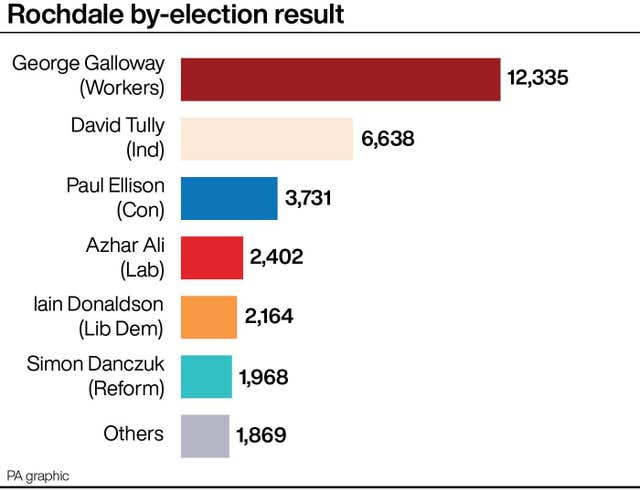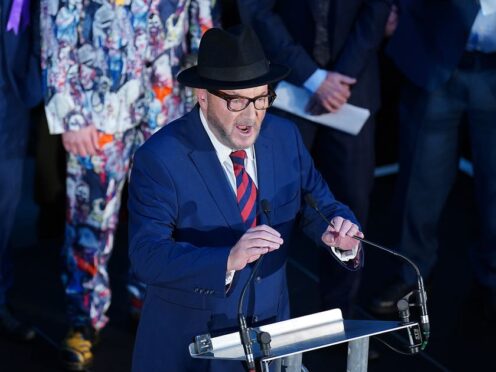George Galloway has won the Rochdale by-election after a controversial and chaotic campaign.
Mr Galloway’s campaign team claimed early on in the night that the former Labour and Respect MP would win “comfortably”, and so it proved. The Workers Party of Great Britain leader received just under 40% of the vote.
In his victory speech, Mr Galloway began by focusing on Palestine, saying: “Keir Starmer, this is for Gaza. You have paid, and you will pay, a high price for the role that you have played in enabling, encouraging and covering for the catastrophe presently going on in occupied Palestine in the Gaza Strip.”
He said he would put Rochdale councillors “on notice” that he intended to form a “grand alliance” to “clean the town hall up” at the local elections in May.
After he was interrupted by a heckler accusing him of being a “climate change denier”, and confetti was thrown at him, he went on to pledge to campaign for the return of a maternity ward to Rochdale and to help save the town’s troubled football club.
His majority of 5,697 votes amounted to 18.3% of the total, on a turnout of 39.7%, a little higher than the two recent by-elections in Wellingborough and Kingswood.
The surprise runner-up was David Tully, a local businessman and independent candidate, who secured more than 6,600 votes.
The Rochdale campaign has been mired in controversy and claims of intimidation and divisive tactics.
Labour withdrew support for its candidate, Azhar Ali, after a recording emerged in which he claimed Israel was complicit in the terrorist attacks of October 7, seeing Mr Galloway become the firm favourite for the seat.
Mr Ali remained listed as the Labour candidate as the party’s decision came too late for ballot papers to be changed.
A Labour spokesperson said: “We deeply regret that the Labour party was unable to field a candidate in this by-election and apologise to the people of Rochdale. George Galloway only won because Labour did not stand.

“Rochdale deserved the chance to vote for an MP that would bring communities together and deliver for working people. George Galloway is only interested in stoking fear and division. As an MP he will be a damaging force in our communities and public life.
“The Labour Party will quickly begin the process to select a new Labour candidate for the general election, and will be campaigning hard to deliver the representation and fresh start that Rochdale deserves.”
Reform UK’s leader Richard Tice claimed his candidate, former Rochdale MP Simon Danczuk, had received a death threat during the campaign and said his party’s campaign team had been subject to “daily intimidation and slurs”.
Recriminations continued after polls closed, with Mr Tice alleging to the PA news agency that “menacing behaviour” had featured throughout the campaign and questioning the validity of the postal ballots returned during the contest.
He said: “This by-election and result should act as a serious wake-up call to those in power and indeed to the entire electorate.
“We are supposed to be a beacon of democracy, this shameful contest has been more characteristic of a failed state.”
Former Reform UK leader Nigel Farage has previously criticised postal voting on a number of occasions following defeats for his various parties.
The party’s candidate, Mr Danczuk, represented the seat for Labour but was barred from standing for the party in 2017 after he admitted sending “inappropriate” messages to a 17-year-old girl.
Mr Danczuk secured a little more than 6% of the vote, coming sixth behind Mr Ali, the former Labour candidate.
Independent candidate William Howarth agreed with Mr Tice that there had been an “element of intimidation” during the campaign.
But Mr Galloway denied his supporters had engaged in any intimidation, and claimed on Sky News that Mr Tice had invited him to be a Reform UK candidate in a recent by-election.
He added that he hoped he would be introduced to the Commons by Conservative former minister Sir David Davis and the former Labour leader, and now independent MP, Jeremy Corbyn.
A spokesperson for the charity Campaign Against Antisemitism said: “George Galloway has an atrocious record of baiting the Jewish community.”
They added: “Given his historic inflammatory rhetoric and the current situation faced by the Jewish community in this country, we are extremely concerned by how he may use the platform of the House of Commons in the remaining months of this Parliament.”
